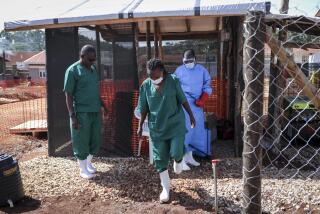Canada Tests Woman for Ebola
- Share via
NEW YORK — A woman who flew from Congo to Canada via the New York area is being tested for hemorrhagic viruses, including Ebola, after being hospitalized in Canada over the weekend with a mystery illness.
The Congolese woman, who has not been identified, is being kept in isolation in a hospital in Hamilton, Ontario, and has been slipping in and out of consciousness since Sunday, doctors say. Blood samples have been sent to Canada’s highest-level testing center, in Winnipeg, as well as to the Centers for Disease Control and Prevention in Atlanta. Results are expected today or Thursday.
Her symptoms, including a high fever and bleeding, are “possibly compatible” with Ebola and other hemorrhagic fevers, which can cause victims to bleed to death, said Dr. Mark Loeb, an infectious-disease specialist at Henderson General Hospital in Hamilton.
Hospital staff members are taking significant precautions--wearing gloves and face shields--when treating the woman. Doctors suggested that the illness could also be a severe bacterial infection such as meningitis.
Canadian health officials have downplayed the case to keep people from panicking, stressing that the fever can be passed only through bodily fluids such as blood, saliva or semen. Although Emergency Preparedness Canada, the government’s civilian defense and health agency, has asked for passenger lists of the flights that the woman was on, it is only so it can notify fellow fliers that they aren’t likely to become ill, the agency said.
“It’s not because people are in medical danger. You can’t get Ebola from casual contact,” said Ron St. John, the agency’s executive director. “People in planes [or] trains, baggage handlers or people walking through the airport are not at risk.”
The woman did have close contact with two friends since she arrived over the weekend, and public health officials are observing them. Ebola typically has an incubation period of five to 12 days, but symptoms could take 21 days to appear. There is no cure.
Responding to criticism that Canada’s health restrictions for travelers are lax, Citizenship and Immigration Minister Elinor Caplan said Tuesday that it would be logistically difficult and a possible violation of civil liberties to give medical tests to each of the 200 million people who come into Canada each year.
“It is impossible,” Caplan said, “to shrink-wrap our borders.”
If the disease turns out to be Ebola, it would be the first reported case in North America. Congo suffered one of the worst outbreaks of the fever; Uganda has also battled an epidemic that killed 173 people last year. But on Tuesday, international health officials announced that no new cases had been reported in 21 days and that they are preparing to declare the outbreak over.
More to Read
Sign up for Essential California
The most important California stories and recommendations in your inbox every morning.
You may occasionally receive promotional content from the Los Angeles Times.













